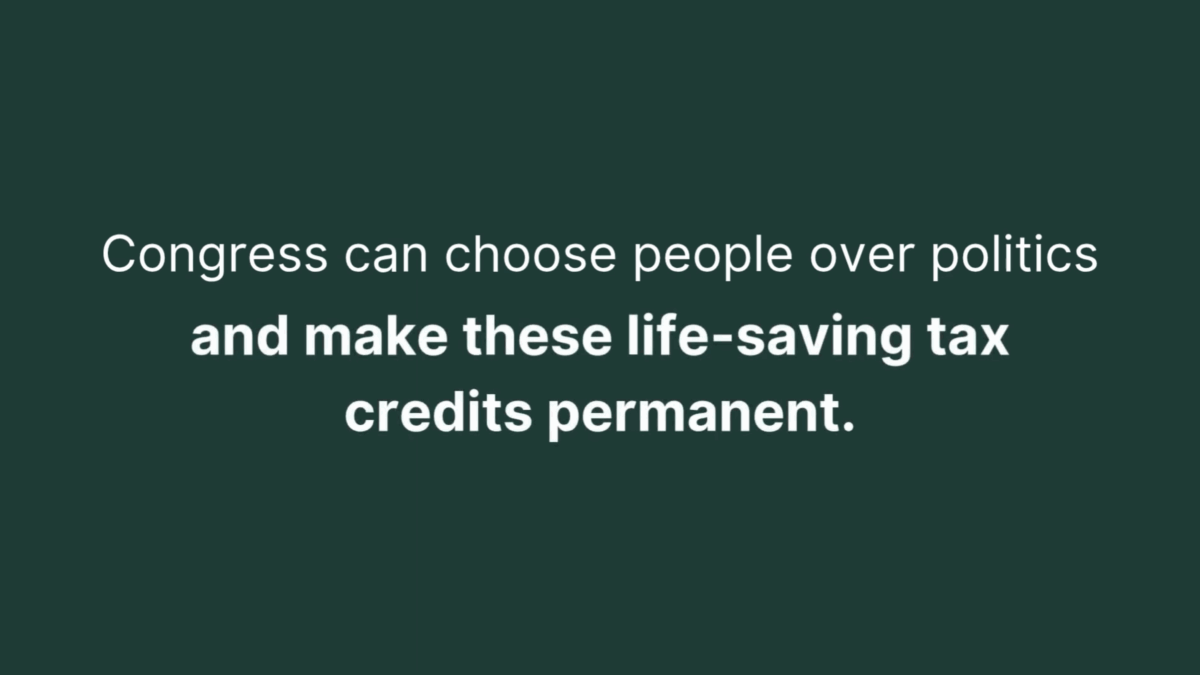This Open Enrollment, Congress Must Act
When the Affordable Care Act (ACA) was signed into law in 2010, it transformed health care in America by making quality, affordable care a reality for millions of people — regardless of race, income, or where they live. It was the most significant health policy of this century, putting people over profit and reducing racial and economic disparities in access to care.
In the last 15 years, the ACA has helped reduce the uninsured rate to just eight percent. Of the record 23.6 million people who signed up for a Marketplace plan last year, 93% received a tax credit to make it much more affordable to do so. In 2021, Congress enhanced these tax credits, allowing more low- and middle-income people to afford health insurance, which led to record enrollment rates.
For more than a decade, the ACA has expanded coverage, brought down health care costs for families, and ensured that pre-existing conditions don’t lock people out of care.
However, we are currently at the beginning of an open enrollment unlike any we’ve ever seen before, because for the first time since the ACA became law, people’s ability to access and afford health care is under grave threat.
Currently, Congress is playing political games by refusing to make the enhanced tax credits that make the ACA accessible to so many permanent.
If lawmakers fail to act, families will face staggering premium hikes and enormous out-of-pocket costs. Most families’ premiums are going to double unless Congress makes the enhanced Affordable Care Act premium tax credits permanent. For many, that means paying hundreds of dollars more each month just to keep the same coverage — a blow that will hit household budgets hard. The Congressional Budget Office warns that about 4 million people could lose coverage.
And all of this is on top of the devastating health care cuts that Republicans passed earlier this year that will cause 10 million people to lose Medicaid coverage.
This coming crisis won’t just impact those on Affordable Care Act Marketplace plans; when some of us can’t access affordable, quality care, we all bear the brunt of increased costs.
We’ve seen what happens when people lose coverage. Medical debt surges and people fall prey to predatory payment products, like deferred interest credit cards, to pay for care. Families cut back on essentials. Hospitals absorb uncompensated care and lost revenue, which can lead to closures. The country’s already strained health care workforce — made up disproportionately of Black and Hispanic women — bears the emotional and financial fallout.
This isn’t some abstract policy debate. At Community Catalyst, we have heard from thousands of people who will be impacted. People like:
Ginger in North Carolina:
Our family currently pays over $800 monthly for health insurance. If the subsidies are repealed, we are looking at around $2000 monthly. We will have to drop coverage and we cannot pay that much for just the premium.
Emily in Texas:
If the [Enhanced Premium Tax Credits] for the ACA go away, my monthly insurance premium would increase by $625, more than half my monthly income.
Robin in Kansas:
I work full-time as a minister… I pay for my own healthcare. Without help, my premiums would be more than $2000 per month plus deductible and co-pay. That is more than [half] of my salary!
Ricky in Oregon:
It keeps me up at night thinking [about] what we would do were we to lose those tax credits. There are simply not enough hours in the day… to pick up a fourth job.
Jason in Pennsylvania:
It’s only because of the premium tax credits that I’ve been able to afford that coverage. All of my results are looking positive, but I’m going to need to be monitored for this condition for the rest of my life in one way or another.
Rachel in Kansas:
I’m a single mother working full time and finishing a master’s degree. I currently pay for insurance through my employer but can barely afford to pay my monthly bills. I’m already considering dropping the insurance at the beginning of the year to help me make ends meet. If enhanced premium credits are allowed to expire, I will definitely not be able to afford coverage. Stack this on top of a looming graduation date, means my student loans will go into repayment whether or not I’m able to find a job that justifies the debt. This and a lack of access to other basic life necessities means Kansas will become a place I once lived rather than a place I can build a life and contribute to my community.
Ginger, Emily, Robin, Ricky, Jason and Rachel are not alone. There are millions more people just like them.
As open enrollment begins, it is important to remember that health care isn’t a luxury; it’s a right. While the wealthy can access the care they need, millions of families are left to navigate medical debt, delayed treatment, or no care at all. We cannot allow lawmakers to make this crisis worse.
We all benefit when health care is accessible and affordable for everyone, and we must stand together to protect that right.
Take Action
Add your name to this petition to demand Congress make enhanced premium tax credits permanent and put people over profits.
